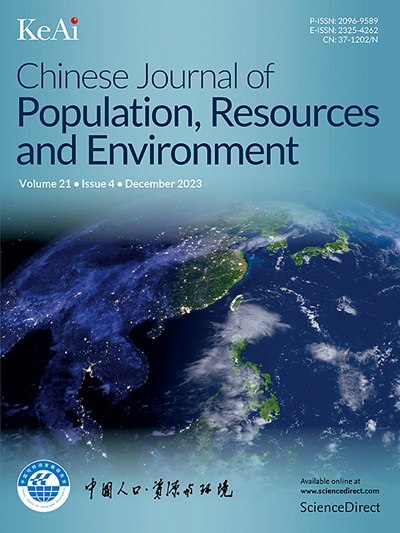Environmental Phillips and Kuznets curves in organization for economic cooperation and development states: Fresh insights
IF 4.8
4区 环境科学与生态学
Q2 ENVIRONMENTAL STUDIES
Chinese Journal of Population Resources and Environment
Pub Date : 2025-09-01
DOI:10.1016/j.cjpre.2025.07.002
引用次数: 0
Abstract
This research extends the literature on the environmental Phillips curve (EPC) and environmental Kuznets curve (EKC) by focusing on the 38 member economies of the Organization for Economic Co-operation and Development (OECD). Using panel data from 2000 to 2021, the study employs several econometric techniques, including fixed effects, feasible generalized least squares, two-stage least squares, and the generalized method of moments. Our primary findings reveal that unemployment has a significant negative impact on CO2 emissions, thereby supporting the validity of the EPC hypothesis within OECD countries. This suggests a trade-off between unemployment and reductions in CO2 emissions. Similarly, the results validate the EKC hypothesis, with further analysis indicating that the EKC exhibits an N-shaped curve—an important contribution to the literature on environmental dynamics in advanced economies. Additionally, the results show that both trade openness and renewable energy usage have significantly improved environmental quality in OECD economies. Finally, extensive causality testing identifies both one-way and two-way causal relationships among the key variables examined. These findings have important policy implications for the management of environmental quality and macroeconomic variables in the OECD context.
经济合作与发展国家组织中的环境菲利普斯与库兹涅茨曲线:新见解
本研究扩展了环境菲利普斯曲线(EPC)和环境库兹涅茨曲线(EKC)的文献,重点关注经济合作与发展组织(OECD)的38个成员经济体。本研究使用2000 - 2021年的面板数据,采用固定效应、可行广义最小二乘法、两阶段最小二乘法和广义矩量法等计量经济学方法。我们的主要研究结果表明,失业对二氧化碳排放有显著的负面影响,从而支持EPC假设在经合组织国家的有效性。这表明在失业和减少二氧化碳排放之间需要权衡取舍。同样,结果验证了EKC假设,进一步分析表明EKC呈n形曲线,这是对发达经济体环境动态文献的重要贡献。此外,研究结果表明,贸易开放和可再生能源的使用都显著改善了经合组织经济体的环境质量。最后,广泛的因果关系检验确定单向和双向因果关系之间的关键变量检查。这些发现对经合发组织环境质量和宏观经济变量的管理具有重要的政策意义。
本文章由计算机程序翻译,如有差异,请以英文原文为准。
求助全文
约1分钟内获得全文
求助全文
来源期刊

Chinese Journal of Population Resources and Environment
ENVIRONMENTAL STUDIES-
CiteScore
4.30
自引率
1.10%
发文量
791
审稿时长
79 days
期刊介绍:
The Chinese Journal of Population, Resources and Environment (CJPRE) is a peer-reviewed international academic journal that publishes original research in the fields of economic, population, resource, and environment studies as they relate to sustainable development. The journal aims to address and evaluate theoretical frameworks, capability building initiatives, strategic goals, ethical values, empirical research, methodologies, and techniques in the field. CJPRE began publication in 1992 and is sponsored by the Chinese Society for Sustainable Development (CSSD), the Research Center for Sustainable Development of Shandong Province, the Administrative Center for China's Agenda 21 (ACCA21), and Shandong Normal University. The Chinese title of the journal was inscribed by the former Chinese leader, Mr. Deng Xiaoping. Initially focused on China's advances in sustainable development, CJPRE now also highlights global developments from both developed and developing countries.
 求助内容:
求助内容: 应助结果提醒方式:
应助结果提醒方式:


